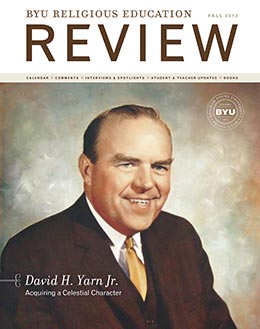Education at Brigham Young University, including courses in Religious Education, is intended to be both intellectually enlarging and spiritually strengthening (http://
When thinking of gospel scholarship, I am reminded of my experience in years past teaching at BYU’s Jerusalem Center for Near Eastern Studies. Most students came for the whole experience—courses, fieldtrips, and interaction with the people, culture, history, and land of Israel and its neighbors. Some students, however, seemed to have come intent on a vacation: “Required courses—why do we have to take these?”; “Who wants to do schoolwork in Israel?!” I found myself emphasizing that the Jerusalem Center program existed for “travel study.” Not just travel. And not merely the type of study one could do in Provo, but a great combination of these two dimensions of experience—travel and study.
I believe this illustrates well the attributes of gospel scholarship. It is not just talking or writing about the gospel, although it is based on and informed by the perspectives of the restored gospel of Jesus Christ. Gospel scholarship is scholarship that is wrapped in and informed by faith in Jesus Christ as our sole Savior and the principles of the restored gospel—but it is still scholarship. As such, it must be doctrinally sound, as well as intellectually honest, historically accurate, and clearly expressed and developed. It shows that authors have lived with and wrestled with their topics for some time. Thus, gospel scholarship is not less scholarship because it focuses on gospel-related topics, just as travel-study is not less study because it is travel based. Because it is scholarship, gospel scholarship demonstrates that authors know and have applied appropriate methodologies in dealing with their topics. Gospel scholarship, like scholarship in general, is based on research and analysis. Just as it sounds, research has to do with searching, inquiring, investigating.
Many professors of Religious Education choose to publish some of their gospel scholarship through the Religious Studies Center. Whether publications originate with professors of Religious Education or other authors, our hope is always that Religious Studies Center publications provide a model of good gospel scholarship and encourage Saints to engage in their own productive study of the gospel and gospel-related topics. The opportunity to participate in such study is a great blessing.
Dana M. Pike
Publications Director,
BYU Religious Studies Center
